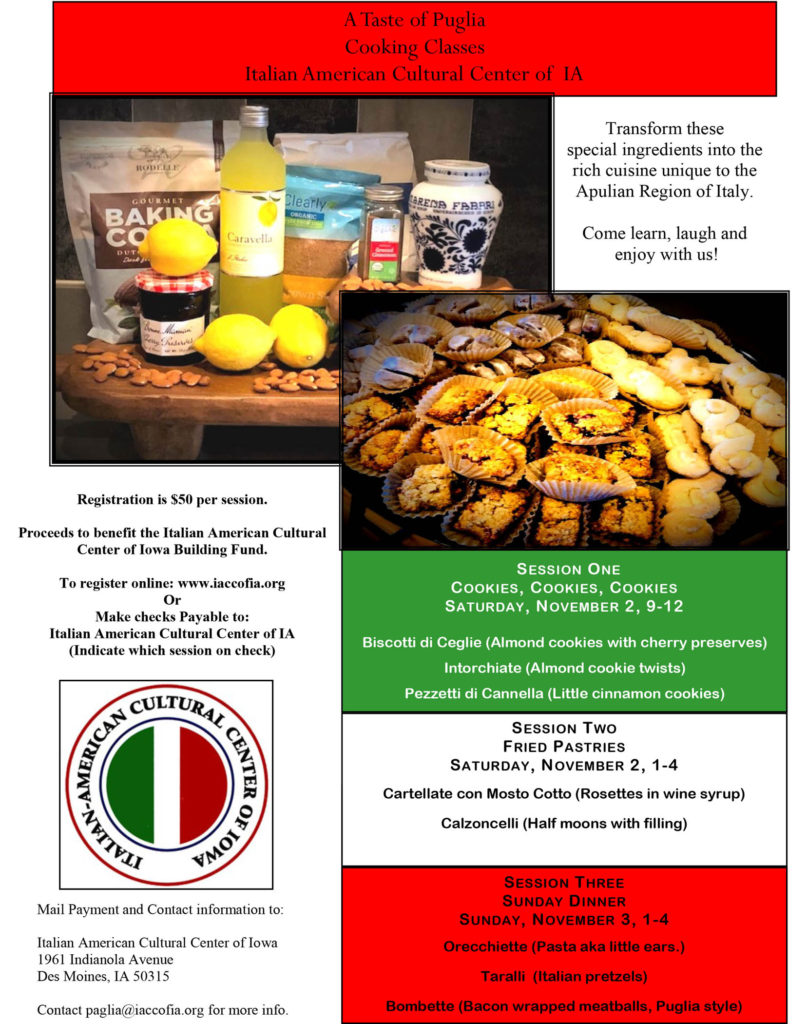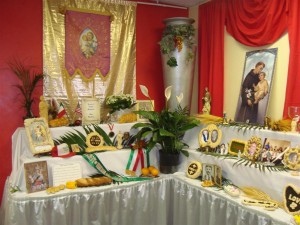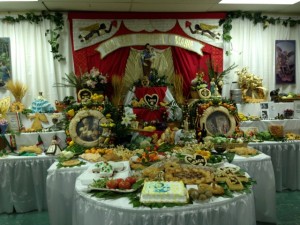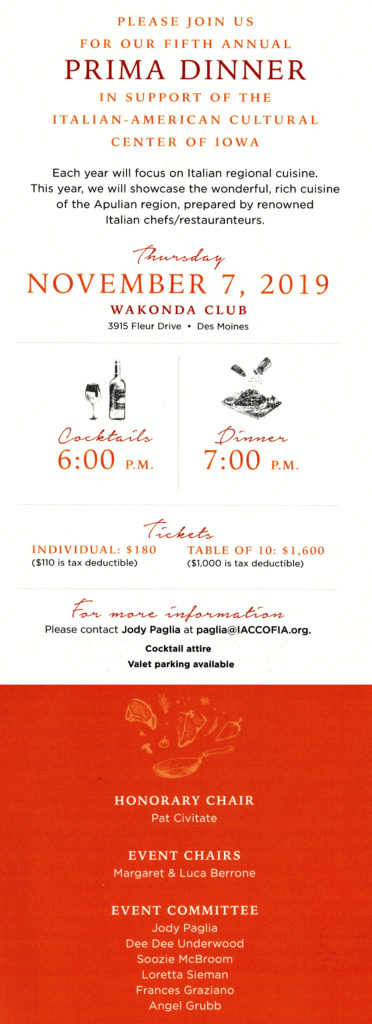
Archive for Culture
An Evening in Puglia
PLEASE SAVE THE DATE – November 7, 2019

And join our Honorary Chair Pat Civitate for our 5th Annual Fundraiser Dinner “An Evening in Puglia” benefitting the Italian American Cultural Center of Iowa.
We will be featuring the diverse and rich cuisine from the Apulian Region known for burrata, taralli, orecchiette and of course some incredible wines!
Wakonda Club, 3915 Fleur Drive, Des Moines
Cocktails 6:00, Dinner 7:00
For more details please contact Jody Paglia at paglia@iaccofia.org A Presto!!
Halloween in Italy
Read how this USA holiday is celebrated in Italy.
Saint Joseph Altar Celebration
 The Italian-American Cultural Center of Iowa will hold its 20th annual St. Joseph Altar celebration on March 18th and 19th, 2017.
The Italian-American Cultural Center of Iowa will hold its 20th annual St. Joseph Altar celebration on March 18th and 19th, 2017.
Doors open at 5:30 PM on Saturday, March 18th with the blessing of the altar at 6:00 PM. Following the blessing, the children will present the “tupa tupa” (knocking) pageant. A traditional Lenten meal will be served family style after the blessing.
Altar visitations will continue on Sunday, March 19th, the feast of St. Joseph, patron of families and laborers. Visitation will begin at 9:00 AM. Refreshments will be provided during the day. This year’s celebration will conclude with the incineration of petitions at 4:00 PM.
Both days are open to the public free of charge. A free-will offering will be accepted. All attending either of the celebrations will be given a gift bag containing a St. Joseph prayer card, St. Joseph medal, blessed bread and the traditional “lucky” fava bean. All proceeds, as well as the fruits, vegetables, breads, pastries and financial contributions will be distributed to the St. Joseph Shelter, the Bidwell Center and the Catholic Worker House.
Family Altar Sponsorship Requests
The St. Joseph Altar Celebration is comprised of a main altar and additional family-sponsored side altars. Families who would like to sponsor an altar provide items which represent their family such as statues, linens, family pictures, etc. They have the option of decorating their altar themselves or providing the items for the committee to decorate their altars for them. The committee provides flowers and other traditional items to each of the altars. to request a family altar or for additional information, please feel free to call the chairperson at 244-4672 or 250-8804.
Baking
 Several days are required for the baking of the traditional St. Joseph cookies and breads. Those who would like to come and learn the preparation of new kinds of sweets are invited to attend one of several baking sessions. There is a wide variety of cookies that are made. Volunteers will also be making several pounds of fresh pasta that will be served at both the dinner and the luncheon.
Several days are required for the baking of the traditional St. Joseph cookies and breads. Those who would like to come and learn the preparation of new kinds of sweets are invited to attend one of several baking sessions. There is a wide variety of cookies that are made. Volunteers will also be making several pounds of fresh pasta that will be served at both the dinner and the luncheon.
Baking will run March 8th, 9th, 10th,13th,14th,15th,16th and 17th at 9:00 am each day.
For more information about baking for the celebration, please call the chairperson at 244-4672 or 250-8804.
La Festa Degli Innamorati
 From the country that gave us Romeo and Juliet, famous novels like “I Promessi Sposi”, and romantic gondola rides, there’s no doubt that Italy is THE country for lovers. Even the Italian language, which is so expressive and precise in thought and emotion, is considered one of the most romantic and beautiful of all languages. So how do Italians celebrate Saint Valentine’s Day? Logic would say that Valentine’s Day is a huge celebration, right? Italy does take its celebrations seriously, but current-day celebrations are not as extensive as you would think. Let’s look at the history of Saint Valentine’s Day, or “La Festa Degli Innamorati” in Italy:
From the country that gave us Romeo and Juliet, famous novels like “I Promessi Sposi”, and romantic gondola rides, there’s no doubt that Italy is THE country for lovers. Even the Italian language, which is so expressive and precise in thought and emotion, is considered one of the most romantic and beautiful of all languages. So how do Italians celebrate Saint Valentine’s Day? Logic would say that Valentine’s Day is a huge celebration, right? Italy does take its celebrations seriously, but current-day celebrations are not as extensive as you would think. Let’s look at the history of Saint Valentine’s Day, or “La Festa Degli Innamorati” in Italy:
 Ancient Traditions The origins of Valentine’s Day lie in ancient Pagan fertility day celebrations. In 494 AD, Pope Gelasio I declared a Valentine Day celebration in honor of Saint Valentine to replace the Pagan festival, and the original Saint Valentine’s festivities were celebrated as a spring festival where lovers would gather outside in gardens or parks to listen to music and exchange poetry. One ancient tradition is for an unmarried girl to wake up early and stand by her window. Legend has it that the first man she sees that day will marry her within a year.
Ancient Traditions The origins of Valentine’s Day lie in ancient Pagan fertility day celebrations. In 494 AD, Pope Gelasio I declared a Valentine Day celebration in honor of Saint Valentine to replace the Pagan festival, and the original Saint Valentine’s festivities were celebrated as a spring festival where lovers would gather outside in gardens or parks to listen to music and exchange poetry. One ancient tradition is for an unmarried girl to wake up early and stand by her window. Legend has it that the first man she sees that day will marry her within a year.
Today’s Traditions Present-day Valentine’s celebrations are more commercialized than in centuries past, and many Italians consider it an American import. On this day, the exchange of gifts is usually only between lovers. Usually a couple will go out to dinner, or prepare a nice candlelit dinner at home. A popular gift is the Baci Perugina chocolate-covered hazelnut with a romantic poetic quote in 4 different languages hidden inside. And that is basically the extent of Valentine’s Day celebrations in Italy. But if you’ve traveled in Italy in the past few years, you’ve probably noticed lucchetti, or padlocks, attached to bridges, railing, and lampposts. While not an Italian invention, this “locks of love” tradition started in Italy in 2006 when novelist and screen writer Federico Moccia wrote a best-selling book called Ho voglio di te (I want you), followed by a movie by the same name.  The story, about a pair of young Romans, includes a lie: the hero tells the young lady he desires of a legend (invented by him) in which lovers wrap a chain around the third lamppost on the north side of Rome’s Ponte Milvio bridge (built in 206 BC), lock it, and throw the key into the Tiber River, symbolizing the unbreakable bond uniting them. Between the popularity of the story and the Italian tradition of not being shy about expressing true amore, before long thousands of locks and chains had piled up, and the lamps atop two of the bridge’s lampposts actually crumbled under their weight. City officials who tried to solve the problem were accused – and we all know this is BAD in Italy – of being anti-love: “The left is against lovers,” one rightist city official, Marco Clarke, charged. Finally a compromise was reached and official spots for the locks were built – six sets of steel posts with chains on the bridge – so lovers could declare themselves without damaging the city’s infrastructure. And so the tradition began, and now it has spread throughout the country, with couples writing their names or initials on the locks before affixing them to posts or railings.
The story, about a pair of young Romans, includes a lie: the hero tells the young lady he desires of a legend (invented by him) in which lovers wrap a chain around the third lamppost on the north side of Rome’s Ponte Milvio bridge (built in 206 BC), lock it, and throw the key into the Tiber River, symbolizing the unbreakable bond uniting them. Between the popularity of the story and the Italian tradition of not being shy about expressing true amore, before long thousands of locks and chains had piled up, and the lamps atop two of the bridge’s lampposts actually crumbled under their weight. City officials who tried to solve the problem were accused – and we all know this is BAD in Italy – of being anti-love: “The left is against lovers,” one rightist city official, Marco Clarke, charged. Finally a compromise was reached and official spots for the locks were built – six sets of steel posts with chains on the bridge – so lovers could declare themselves without damaging the city’s infrastructure. And so the tradition began, and now it has spread throughout the country, with couples writing their names or initials on the locks before affixing them to posts or railings.
In Italy, Saint Valentine’s Day is not about expensive gifts, but instead a day to show someone you care; a day to say “Ti Voglio Bene” (I love you). And isn’t that what Valentine’s Day is supposed to be about, anyway?
2014 St. Joseph’s Altar Photos
2013 St. Joseph Altar Celebration
 Thank you to all of the volunteers and attendees of the 16th annual St. Joseph Altar Celebration, held at the Italian-American Cultural Center of Iowa on March 18th and 19th, 2013.
Thank you to all of the volunteers and attendees of the 16th annual St. Joseph Altar Celebration, held at the Italian-American Cultural Center of Iowa on March 18th and 19th, 2013.
Doors opened at 5:30 PM on Monday, March 18th. Msgr. Frank Chiodo, pastor of St. Anthony parish in Des Moines, blessed the altar following the children’s “tupa tupa” (knocking) pageant. A traditional Lenten meal was then served family style after the blessing.
Altar visitations continued on Tuesday, March 19th, the feast of St. Joseph, patron of families and laborers. Refreshments were provided during the day, and a luncheon was served from 11:00 AM until 2:00 PM. The celebration concluded with the incineration of petitions.
Both days were open to the public free of charge, while a free-will offering was accepted. All attending either of the celebrations were given a gift bag containing a St. Joseph prayer card, St. Joseph medal, blessed bread and the traditional “lucky” fava bean. All proceeds, as well as the fruits, vegetables, breads, pastries and financial contributions were distributed to the St. Joseph Shelter, the Bidwell Center and the Catholic Worker House.
Please enjoy the photos from this year’s event:





































